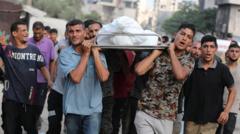Is Israel Really Committing Genocide in Gaza? Experts Weigh In

Published: 2025-09-01 17:27:05 | Category: world
This article explores the recent declaration by the International Association of Genocide Scholars (IAGS) that Israel's actions in Gaza meet the legal definition of genocide as outlined by the UN. The resolution highlights widespread human rights violations and provides a comprehensive analysis of the ongoing conflict, examining both the humanitarian crisis and the implications of such a serious accusation.
Last updated: 12 October 2023 (BST)
Key Takeaways
- The IAGS resolution claims Israel's actions in Gaza constitute genocide, war crimes, and crimes against humanity.
- 86% of IAGS members who voted supported the resolution, reflecting significant academic concern over the situation.
- The UN Genocide Convention defines genocide as actions intended to destroy a national, ethnic, racial, or religious group.
- Israel’s government rejects the claims, asserting its actions are acts of self-defence against Hamas.
- The International Court of Justice is reviewing a case regarding alleged genocide, with no ruling yet made.
Understanding the IAGS Resolution
The International Association of Genocide Scholars (IAGS) consists of experts dedicated to the study of genocide and related issues. In a recent decision, they passed a resolution asserting that Israel's military actions in Gaza during the ongoing conflict amount to genocide. This resolution is particularly notable due to the IAGS's stature as a leading authority on such matters, comprising around 500 members, including Holocaust scholars and human rights advocates.
Details of the Resolution
The resolution, spanning three pages, outlines various actions undertaken by Israel over the last 22 months of conflict that meet the criteria for genocide as established by international law. The IAGS indicates that these actions include:
- Widespread attacks on civilian infrastructure, such as healthcare and education.
- Targeting of individuals and groups essential for the survival of the Palestinian population.
- Statements from Israeli leadership dehumanising Palestinians, which further exacerbate the conflict.
- The forced expulsion of Palestinians and destruction of housing in Gaza.
Legal Implications of Genocide
The term "genocide" is defined under the 1948 UN Genocide Convention, which specifies that acts committed "with intent to destroy, in whole or in part, a national, ethnical, racial or religious group" qualify as genocide. This definition is critical in the ongoing discourse surrounding the Israeli-Palestinian conflict, as it sets a legal framework for assessing the actions of both parties.
Israel's Response to Accusations
The Israeli government has categorically rejected the charges made by the IAGS. A spokesperson for the Israeli Foreign Ministry characterised the resolution as based on "Hamas lies" and poor research, labelling it an "embarrassment to the legal profession." They contend that Israel is the victim of genocide, implying that the narrative is skewed against them.
The Context of the Conflict
The latest outbreak of violence began on 7 October 2023, when Hamas launched an attack that resulted in the deaths of approximately 1,200 people in Israel. While the IAGS acknowledges this act as a crime, they argue that the Israeli response has been disproportionate, targeting not just Hamas but the entire civilian population in Gaza.
Impact on Civilians
One of the most alarming aspects highlighted by the IAGS resolution is the widespread civilian casualties in Gaza. According to the Hamas-run Ministry of Health, over 63,557 people have reportedly been killed and around 160,660 injured, although these figures do not differentiate between combatants and non-combatants. Such high numbers raise concerns about the humanitarian crisis unfolding in the region.
International Reactions and Legal Proceedings
Responses to the IAGS resolution have varied across international organisations and governments. While several human rights groups, including Israeli organisations, have echoed the sentiment of genocide, the UN and certain Western nations maintain that only a court ruling can definitively declare such an act. The International Court of Justice (ICJ) is currently reviewing a case brought by South Africa, which argues that Israel is committing genocide. The ICJ has yet to issue a ruling and has granted Israel until January 2026 to present its defence.
The Role of Humanitarian Aid
In addition to the allegations of genocide, the IAGS resolution notes the humanitarian crisis exacerbated by Israel's control over Gaza's borders. The ongoing restrictions on food and medical aid have led to severe shortages, with the UN's food monitor confirming famine conditions in parts of Gaza. Under international law, as the occupying power, Israel is responsible for protecting civilian life, which includes preventing starvation and ensuring access to basic necessities.
Concluding Thoughts
The declaration by the IAGS marks a significant escalation in the academic and international discourse surrounding the Israeli-Palestinian conflict. As the situation continues to evolve, the implications of such accusations could have far-reaching effects on international relations and humanitarian efforts. The conflict remains deeply polarised, with both sides holding firmly to their narratives. As the world watches, the pressing question remains: what steps will be taken globally to address the alleged humanitarian crises and potential breaches of international law?
FAQs
What is the International Association of Genocide Scholars (IAGS)?
The IAGS is the largest professional association of genocide scholars worldwide, focusing on the study and prevention of genocide and related issues. It comprises experts from various fields, including history, law, and human rights.
What does genocide mean under international law?
Genocide is defined by the 1948 UN Genocide Convention as acts committed with the intent to destroy, in whole or in part, a national, ethnic, racial, or religious group. This includes killing, causing serious bodily or mental harm, and deliberately inflicting conditions calculated to bring about a group's physical destruction.
How has Israel responded to the genocide accusations?
Israel has denied the accusations of genocide, arguing that its military actions are necessary self-defence against Hamas. The Israeli government claims that the resolution from the IAGS is based on misinformation and poor research.
What is the current humanitarian situation in Gaza?
The humanitarian situation in Gaza is dire, with reports of widespread casualties and shortages of food and medical supplies. The Hamas-run Ministry of Health has reported over 63,557 deaths and 160,660 injuries since the conflict escalated, raising significant concerns about the well-being of civilians.
What is the role of the International Court of Justice (ICJ) in this matter?
The ICJ is currently reviewing a case brought by South Africa, which alleges that Israel is committing genocide. The court has not yet made a ruling and has given Israel until January 2026 to present its defence.
As the situation in Gaza unfolds, the implications of the IAGS resolution and the ongoing humanitarian crisis cannot be overlooked. How this will influence international law and intervention remains to be seen. #Genocide #GazaConflict #HumanRights



